Deck 15: Partnerships: Termination and Liquidation
Question
Question
Question
Question
Question
Question
Question
Question
Question
Question
Question
Question
Question
Question
Question
Question
Question
Question
Question
Question
Question
Question
Question
Question
Question
Question
Question
Question
Question
Question
Question
Question
Question
Question
Question
Question
Question
Question
Question

Unlock Deck
Sign up to unlock the cards in this deck!
Unlock Deck
Unlock Deck
1/39
Play
Full screen (f)
Deck 15: Partnerships: Termination and Liquidation
1
What is the difference between the dissolution of a partnership and the liquidation of partner ship property
Dissolution of a partnership indicates that only a portion or individual partner(s) are ending the arrangement of the original partnership.This can be in the form of a partner withdrawal or the formation of a new partnership.However, the liquidation of a partnership indicates the final act of the company in question.Any property held by the partnership is sold for cash to pay off any liabilities and expenses incurred.The remaining is divided among the partners equally or at an agreed upon rate.
2
How is a predistribution plan created for a partnership liquidation
Since the amount of time for liquidation can vary greatly and massive amounts of transactions may occur, a pre-distribution plan is necessary to accommodate the chaos.This predistribution plan will serve as a guideline for all future payments.So, this plan will state the appropriate recipient(s) when cash becomes available without having to dig up the changing proposed schedules of liquidation.
An assumed series of losses is considered to produce a pre-distribution plan.The capital balance of one of the partners is eliminated by each of the calculated loss.In this manner, the vulnerability to losses exhibited by each capital account exhibits is determined by the accountant.
The accountant will have establishes a series of losses when the last balance is eliminated that exactly offsets each balance.If the losses do not occur then the effects are measured to develop the pre-distribution plan.In effect, a pattern of available cash (the pre-distribution plan) is created by the accountant by working backward through the assumed losses.
An assumed series of losses is considered to produce a pre-distribution plan.The capital balance of one of the partners is eliminated by each of the calculated loss.In this manner, the vulnerability to losses exhibited by each capital account exhibits is determined by the accountant.
The accountant will have establishes a series of losses when the last balance is eliminated that exactly offsets each balance.If the losses do not occur then the effects are measured to develop the pre-distribution plan.In effect, a pattern of available cash (the pre-distribution plan) is created by the accountant by working backward through the assumed losses.
3
On January 1, the partners of Van, Bakel, and Cox (who share profits and losses in the ratio of 5:3:2, respectively) decide to liquidate their partnership.The trial balance at this date follows: 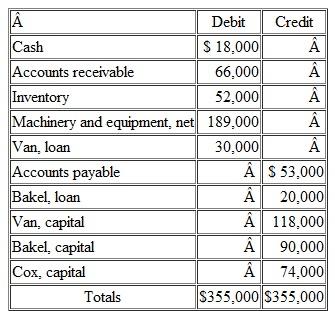 The partners plan a program of piecemeal conversion of the business's assets to minimize liquidation losses.All available cash, less an amount retained to provide for future expenses, is to be distributed to the partners at the end of each month.A summary of the liquidation transactions follows:
The partners plan a program of piecemeal conversion of the business's assets to minimize liquidation losses.All available cash, less an amount retained to provide for future expenses, is to be distributed to the partners at the end of each month.A summary of the liquidation transactions follows: 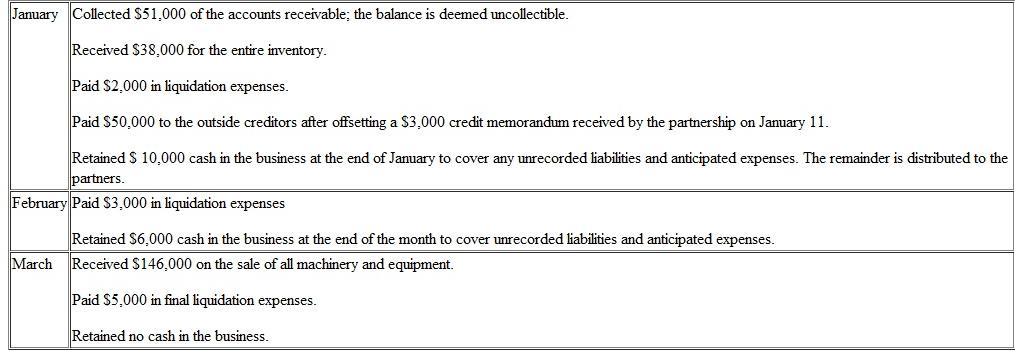 Prepare a schedule to compute the safe installment payments made to the partners at the end of each of these three months.
Prepare a schedule to compute the safe installment payments made to the partners at the end of each of these three months.
 The partners plan a program of piecemeal conversion of the business's assets to minimize liquidation losses.All available cash, less an amount retained to provide for future expenses, is to be distributed to the partners at the end of each month.A summary of the liquidation transactions follows:
The partners plan a program of piecemeal conversion of the business's assets to minimize liquidation losses.All available cash, less an amount retained to provide for future expenses, is to be distributed to the partners at the end of each month.A summary of the liquidation transactions follows:  Prepare a schedule to compute the safe installment payments made to the partners at the end of each of these three months.
Prepare a schedule to compute the safe installment payments made to the partners at the end of each of these three months.This problem requires knowledge of safe installment payments.
All relevant data can be found in the problem.
The accounts receivable has collected $51,000 of the $66,000 amount.Calculate the loss. The inventory was sold to quickly acquire cash for liquidation.Calculate the loss on the inventory.
The inventory was sold to quickly acquire cash for liquidation.Calculate the loss on the inventory.  Create an official schedule detailing the official losses and any potential losses left on the assets.Include any expenses incurred for the month of January.
Create an official schedule detailing the official losses and any potential losses left on the assets.Include any expenses incurred for the month of January. 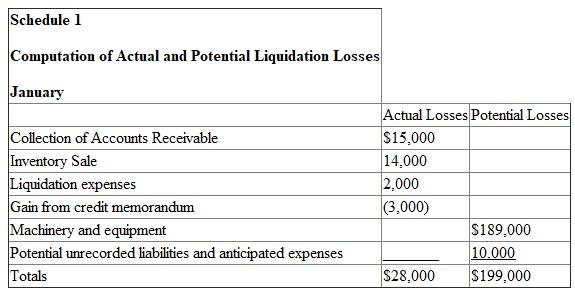 The three partners must share the $28,000 in losses according to the agreed upon 5:3:2 basis.Calculate the amount to be distributed.
The three partners must share the $28,000 in losses according to the agreed upon 5:3:2 basis.Calculate the amount to be distributed. 

 Each of the three partners must share in the distribution of the potential losses for the month of January on the same 5:3:2 basis.Calculate the amount to be distributed.
Each of the three partners must share in the distribution of the potential losses for the month of January on the same 5:3:2 basis.Calculate the amount to be distributed. 

 Each month requires the recording of safe installment payments.First, create an official table determining the ending balances after loans have been paid for the partners.
Each month requires the recording of safe installment payments.First, create an official table determining the ending balances after loans have been paid for the partners. 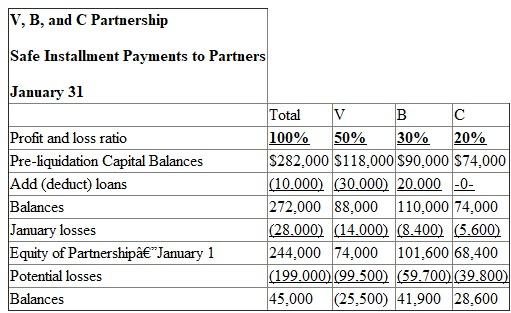 V paid off a $30,000, which is why it is taken from his capital balance, and B acquired a $20,000 loan, which is why it is added to his capital balance.
V paid off a $30,000, which is why it is taken from his capital balance, and B acquired a $20,000 loan, which is why it is added to his capital balance.
It is determined that V has a deficit upon accounting for the potential losses.The other two partners must contribute enough funds to make up for V's loss.Calculate how much the two partners must contribute based on the 3:2 basis.
 Create a table illustrating the safe payment to partners for the month of January.
Create a table illustrating the safe payment to partners for the month of January. 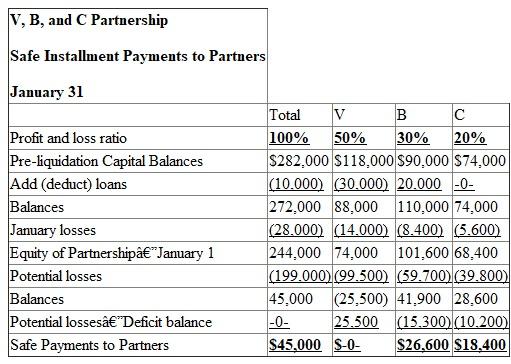 For the month of February, calculate the distribution of the liquidation expenses totaling $3,000.
For the month of February, calculate the distribution of the liquidation expenses totaling $3,000. 

 For the month of February, the partnership was able to retain $6,000 to cover unrecorded liabilities and anticipated expenses.Calculate the distribution of this towards the partners.
For the month of February, the partnership was able to retain $6,000 to cover unrecorded liabilities and anticipated expenses.Calculate the distribution of this towards the partners. 

 Calculate the distribution of payments for equipment and machinery among the partners according the 5:3:2 basis.
Calculate the distribution of payments for equipment and machinery among the partners according the 5:3:2 basis. 

 Create a table illustrating the safe payment to partners for the month of February including the distributions of equipment and machinery, liquidation expenses, and the retained earnings.
Create a table illustrating the safe payment to partners for the month of February including the distributions of equipment and machinery, liquidation expenses, and the retained earnings. 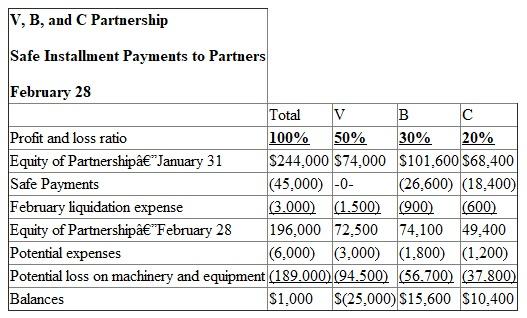 It is determined that V has a deficit upon accounting for the potential losses.The other two partners must contribute enough funds to make up for V's loss.Calculate how much the two partners must contribute based on the 3:2 basis.
It is determined that V has a deficit upon accounting for the potential losses.The other two partners must contribute enough funds to make up for V's loss.Calculate how much the two partners must contribute based on the 3:2 basis. 
 The partners B and C will have to contribute $15,000 and $10,000, respectively towards V's deficit.
The partners B and C will have to contribute $15,000 and $10,000, respectively towards V's deficit.
Create a table illustrating the safe payment to partners for the month of February.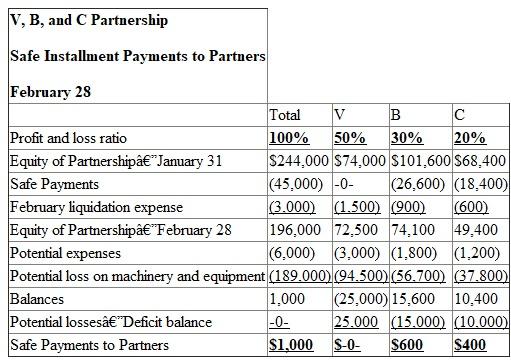 The machinery and the equipment have been sold in March.Calculate the gain or loss on the sale.
The machinery and the equipment have been sold in March.Calculate the gain or loss on the sale.  There has been a loss of $43,000 from the sale of the machinery and equipment.
There has been a loss of $43,000 from the sale of the machinery and equipment.
Since there has been a loss on the equipment and machinery sale, the partners must share the burden of the loss.Calculate the distribution among the partners.

 The partnership incurred $5,000 in liquidation expenses in the month of March.Calculate the distribution of these expenses.
The partnership incurred $5,000 in liquidation expenses in the month of March.Calculate the distribution of these expenses. 

 Create a table illustrating the safe payment to partners for the month of March.
Create a table illustrating the safe payment to partners for the month of March. 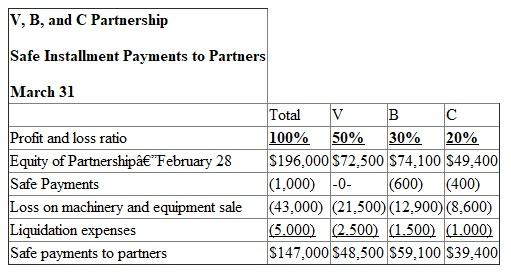
All relevant data can be found in the problem.
The accounts receivable has collected $51,000 of the $66,000 amount.Calculate the loss.
 The inventory was sold to quickly acquire cash for liquidation.Calculate the loss on the inventory.
The inventory was sold to quickly acquire cash for liquidation.Calculate the loss on the inventory.  Create an official schedule detailing the official losses and any potential losses left on the assets.Include any expenses incurred for the month of January.
Create an official schedule detailing the official losses and any potential losses left on the assets.Include any expenses incurred for the month of January.  The three partners must share the $28,000 in losses according to the agreed upon 5:3:2 basis.Calculate the amount to be distributed.
The three partners must share the $28,000 in losses according to the agreed upon 5:3:2 basis.Calculate the amount to be distributed. 

 Each of the three partners must share in the distribution of the potential losses for the month of January on the same 5:3:2 basis.Calculate the amount to be distributed.
Each of the three partners must share in the distribution of the potential losses for the month of January on the same 5:3:2 basis.Calculate the amount to be distributed. 

 Each month requires the recording of safe installment payments.First, create an official table determining the ending balances after loans have been paid for the partners.
Each month requires the recording of safe installment payments.First, create an official table determining the ending balances after loans have been paid for the partners.  V paid off a $30,000, which is why it is taken from his capital balance, and B acquired a $20,000 loan, which is why it is added to his capital balance.
V paid off a $30,000, which is why it is taken from his capital balance, and B acquired a $20,000 loan, which is why it is added to his capital balance.It is determined that V has a deficit upon accounting for the potential losses.The other two partners must contribute enough funds to make up for V's loss.Calculate how much the two partners must contribute based on the 3:2 basis.

 Create a table illustrating the safe payment to partners for the month of January.
Create a table illustrating the safe payment to partners for the month of January.  For the month of February, calculate the distribution of the liquidation expenses totaling $3,000.
For the month of February, calculate the distribution of the liquidation expenses totaling $3,000. 

 For the month of February, the partnership was able to retain $6,000 to cover unrecorded liabilities and anticipated expenses.Calculate the distribution of this towards the partners.
For the month of February, the partnership was able to retain $6,000 to cover unrecorded liabilities and anticipated expenses.Calculate the distribution of this towards the partners. 

 Calculate the distribution of payments for equipment and machinery among the partners according the 5:3:2 basis.
Calculate the distribution of payments for equipment and machinery among the partners according the 5:3:2 basis. 

 Create a table illustrating the safe payment to partners for the month of February including the distributions of equipment and machinery, liquidation expenses, and the retained earnings.
Create a table illustrating the safe payment to partners for the month of February including the distributions of equipment and machinery, liquidation expenses, and the retained earnings.  It is determined that V has a deficit upon accounting for the potential losses.The other two partners must contribute enough funds to make up for V's loss.Calculate how much the two partners must contribute based on the 3:2 basis.
It is determined that V has a deficit upon accounting for the potential losses.The other two partners must contribute enough funds to make up for V's loss.Calculate how much the two partners must contribute based on the 3:2 basis. 
 The partners B and C will have to contribute $15,000 and $10,000, respectively towards V's deficit.
The partners B and C will have to contribute $15,000 and $10,000, respectively towards V's deficit.Create a table illustrating the safe payment to partners for the month of February.
 The machinery and the equipment have been sold in March.Calculate the gain or loss on the sale.
The machinery and the equipment have been sold in March.Calculate the gain or loss on the sale.  There has been a loss of $43,000 from the sale of the machinery and equipment.
There has been a loss of $43,000 from the sale of the machinery and equipment.Since there has been a loss on the equipment and machinery sale, the partners must share the burden of the loss.Calculate the distribution among the partners.


 The partnership incurred $5,000 in liquidation expenses in the month of March.Calculate the distribution of these expenses.
The partnership incurred $5,000 in liquidation expenses in the month of March.Calculate the distribution of these expenses. 

 Create a table illustrating the safe payment to partners for the month of March.
Create a table illustrating the safe payment to partners for the month of March. 
4
Which of the following statements is true concerning the accounting for a partnership going through liquidation
a.Gains and losses are reported directly as increases and decreases in the appropriate capital account.
b.A separate income statement is created to measure only the profit or loss generated during liquidation.
c.Because gains and losses rarely occur during liquidation, no special accounting treatment is warranted.
d.Within a liquidation, all gains and losses are divided equally among the partners.
a.Gains and losses are reported directly as increases and decreases in the appropriate capital account.
b.A separate income statement is created to measure only the profit or loss generated during liquidation.
c.Because gains and losses rarely occur during liquidation, no special accounting treatment is warranted.
d.Within a liquidation, all gains and losses are divided equally among the partners.

Unlock Deck
Unlock for access to all 39 flashcards in this deck.
Unlock Deck
k this deck
5
A partnership has gone through liquidation and now reports the following account balances: 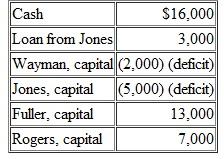 Profits and losses are allocated on the following basis: Wayman, 30 percent; Jones, 20 percent; Fuller, 30 percent; and Rogers, 20 percent.Which of the following events should occur now
Profits and losses are allocated on the following basis: Wayman, 30 percent; Jones, 20 percent; Fuller, 30 percent; and Rogers, 20 percent.Which of the following events should occur now
a.Jones should receive $3,000 cash because of the loan balance.
b.Fuller should receive $11,800 and Rogers $4,200.
c.Fuller should receive $10,600 and Rogers $5,400.
d.Jones should receive $3,000, Fuller $8,800, and Rogers $4,200,
 Profits and losses are allocated on the following basis: Wayman, 30 percent; Jones, 20 percent; Fuller, 30 percent; and Rogers, 20 percent.Which of the following events should occur now
Profits and losses are allocated on the following basis: Wayman, 30 percent; Jones, 20 percent; Fuller, 30 percent; and Rogers, 20 percent.Which of the following events should occur now a.Jones should receive $3,000 cash because of the loan balance.
b.Fuller should receive $11,800 and Rogers $4,200.
c.Fuller should receive $10,600 and Rogers $5,400.
d.Jones should receive $3,000, Fuller $8,800, and Rogers $4,200,

Unlock Deck
Unlock for access to all 39 flashcards in this deck.
Unlock Deck
k this deck
6
Following is a series of independent cases.In each situation, indicate the cash distribution to be made at the end of the liquidation process.Unless otherwise stated, assume that all solvent partners will reimburse the partnership for their deficit capital balances.
Part A
The Simon, Haynes, and Jackson partnership presently reports the following accounts.Jackson is personally insolvent and can contribute only an additional $3,000 to the partnership.Simon is also insolvent and has no available funds.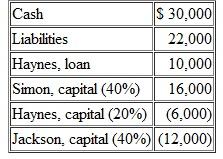 Part B
Part B
Hough, Luck, and Cummings operate a local accounting firm as a partnership.After working together for several years, they have decided to liquidate the partnership's property.The partners have prepared the following balance sheet: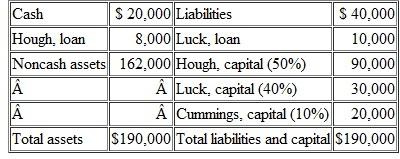 The firm sells the noncash assets for $80,000; it will use $21,000 of this amount to pay liquidation expenses.All three of these partners are personally insolvent.
The firm sells the noncash assets for $80,000; it will use $21,000 of this amount to pay liquidation expenses.All three of these partners are personally insolvent.
Part C
Use the same information as in Part B, but assume that the profits and losses are split 2:4:4 to Hough.Luck, and Cummings, respectively, and that liquidation expenses are only $6,000.
Part D
Following the liquidation of all noncash assets, the partnership of Redmond, Ledbetter, Watson, and Sandridge has the following account balances: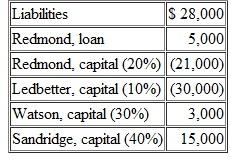 Redmond is personally insolvent.
Redmond is personally insolvent.
Part A
The Simon, Haynes, and Jackson partnership presently reports the following accounts.Jackson is personally insolvent and can contribute only an additional $3,000 to the partnership.Simon is also insolvent and has no available funds.
 Part B
Part B Hough, Luck, and Cummings operate a local accounting firm as a partnership.After working together for several years, they have decided to liquidate the partnership's property.The partners have prepared the following balance sheet:
 The firm sells the noncash assets for $80,000; it will use $21,000 of this amount to pay liquidation expenses.All three of these partners are personally insolvent.
The firm sells the noncash assets for $80,000; it will use $21,000 of this amount to pay liquidation expenses.All three of these partners are personally insolvent.Part C
Use the same information as in Part B, but assume that the profits and losses are split 2:4:4 to Hough.Luck, and Cummings, respectively, and that liquidation expenses are only $6,000.
Part D
Following the liquidation of all noncash assets, the partnership of Redmond, Ledbetter, Watson, and Sandridge has the following account balances:
 Redmond is personally insolvent.
Redmond is personally insolvent.
Unlock Deck
Unlock for access to all 39 flashcards in this deck.
Unlock Deck
k this deck
7
Why would the members of a partnership elect to terminate business operations and liquidate all noncash assets

Unlock Deck
Unlock for access to all 39 flashcards in this deck.
Unlock Deck
k this deck
8
A partnership has the following account balances: Cash, $70,000; Other Assets, $540,000; Liabilities, $260,000; Nixon (50% of profits and losses), $170,000; Cleveland (30%), $110,000; Pierce (20%), $70,000.The company liquidates, and $8,000 becomes available to the partners.Who gets the $8,000

Unlock Deck
Unlock for access to all 39 flashcards in this deck.
Unlock Deck
k this deck
9
The partnership of Frick, Wilson, and Clarke has elected to cease all operations and liqiuidate its business property.A balance sheet drawn up at this time shows the following account balances: 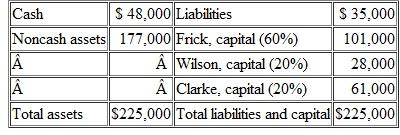 The following transactions occur in liquidating this business:
The following transactions occur in liquidating this business:
• Distributed safe capital balances immediately to the partners.Liquidation expenses of $9,000 are estimated as a basis for this computation.
• Sold noncash assets with a book value of $80,000 for $48,000.
• Paid all liabilities.
• Distributed safe capital balances again.
• Sold remaining noncash assets for $44,000.
• Paid liquidation expenses of $7,000.
• Distributed remaining cash to the partners and closed the financial records of the business permanently.
Produce a final schedule of liquidation for this partnership.
 The following transactions occur in liquidating this business:
The following transactions occur in liquidating this business:• Distributed safe capital balances immediately to the partners.Liquidation expenses of $9,000 are estimated as a basis for this computation.
• Sold noncash assets with a book value of $80,000 for $48,000.
• Paid all liabilities.
• Distributed safe capital balances again.
• Sold remaining noncash assets for $44,000.
• Paid liquidation expenses of $7,000.
• Distributed remaining cash to the partners and closed the financial records of the business permanently.
Produce a final schedule of liquidation for this partnership.

Unlock Deck
Unlock for access to all 39 flashcards in this deck.
Unlock Deck
k this deck
10
During a liquidation, if a partner's capital account balance drops below zero, what should happen
a.The other partners file a legal suit against the partner with the deficit balance.
b.The partner with the highest capital balance contributes sufficient assets to eliminate the deficit.
c.The deficit balance is removed from the accounting records with only the remaining partners sharing in future gains and losses.
d.The partner with a deficit contributes enough assets to offset the deficit balance.
a.The other partners file a legal suit against the partner with the deficit balance.
b.The partner with the highest capital balance contributes sufficient assets to eliminate the deficit.
c.The deficit balance is removed from the accounting records with only the remaining partners sharing in future gains and losses.
d.The partner with a deficit contributes enough assets to offset the deficit balance.

Unlock Deck
Unlock for access to all 39 flashcards in this deck.
Unlock Deck
k this deck
11
A local partnership has only two assets (cash of $10,000 and land with a cost of $35,000).All liabilities have been paid and the following capital balances are currently being recorded.The partners share profits and losses as follows.All partners are insolvent.  a.If the land is sold for $25,000, how much cash does each partner receive in a final settlement
a.If the land is sold for $25,000, how much cash does each partner receive in a final settlement
b.If the land is sold for $15,000, how much cash does each partner receive in a final settlement
c.If the land is sold for $5,000, how much cash does each partner receive in a final settlement
 a.If the land is sold for $25,000, how much cash does each partner receive in a final settlement
a.If the land is sold for $25,000, how much cash does each partner receive in a final settlement b.If the land is sold for $15,000, how much cash does each partner receive in a final settlement
c.If the land is sold for $5,000, how much cash does each partner receive in a final settlement

Unlock Deck
Unlock for access to all 39 flashcards in this deck.
Unlock Deck
k this deck
12
Part A
The partnership of Wingler, Norris, Rodgers, and Guthrie was formed several years ago as a local architectural firm.Several partners have recently undergone personal financial problems and have decided to terminate operations and liquidate the business.The following balance sheet is drawn up as a guideline for this process: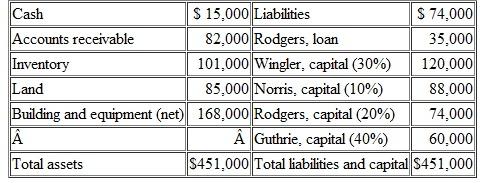 When the liquidation commenced, expenses of $16,000 were anticipated as being necessary to dispose of all property.
When the liquidation commenced, expenses of $16,000 were anticipated as being necessary to dispose of all property.
Prepare a predistribution plan for this partnership.
Part B
The following transactions transpire during the liquidation of the Wingler, Norris, Rodgers, and Guthrie partnership:
• Collected 80 percent of the total accounts receivable with the rest judged to be uncollectible.
• Sold the land, building, and equipment for $ 150,000.
• Made safe capital distributions.
• Learned that Guthrie, who has become personally insolvent, will make no further contributions.
• Paid all liabilities.
• Sold all inventory for $71,000.
• Made safe capital distributions again.
• Paid liquidation expenses of $ 11,000.
• Made final cash disbursements to the partners based on the assumption that all partners other than Guthrie are personally solvent.
Prepare journal entries to record these liquidation transactions.
The partnership of Wingler, Norris, Rodgers, and Guthrie was formed several years ago as a local architectural firm.Several partners have recently undergone personal financial problems and have decided to terminate operations and liquidate the business.The following balance sheet is drawn up as a guideline for this process:
 When the liquidation commenced, expenses of $16,000 were anticipated as being necessary to dispose of all property.
When the liquidation commenced, expenses of $16,000 were anticipated as being necessary to dispose of all property.Prepare a predistribution plan for this partnership.
Part B
The following transactions transpire during the liquidation of the Wingler, Norris, Rodgers, and Guthrie partnership:
• Collected 80 percent of the total accounts receivable with the rest judged to be uncollectible.
• Sold the land, building, and equipment for $ 150,000.
• Made safe capital distributions.
• Learned that Guthrie, who has become personally insolvent, will make no further contributions.
• Paid all liabilities.
• Sold all inventory for $71,000.
• Made safe capital distributions again.
• Paid liquidation expenses of $ 11,000.
• Made final cash disbursements to the partners based on the assumption that all partners other than Guthrie are personally solvent.
Prepare journal entries to record these liquidation transactions.

Unlock Deck
Unlock for access to all 39 flashcards in this deck.
Unlock Deck
k this deck
13
Why are liquidation gains and losses usually recorded as direct adjustments to the partners' capital accounts

Unlock Deck
Unlock for access to all 39 flashcards in this deck.
Unlock Deck
k this deck
14
A local dental partnership has been liquidated and the final capital balances are as follows:  If Rasputin contributes additional cash of $20,000 to the partnership, what should happen to it
If Rasputin contributes additional cash of $20,000 to the partnership, what should happen to it
 If Rasputin contributes additional cash of $20,000 to the partnership, what should happen to it
If Rasputin contributes additional cash of $20,000 to the partnership, what should happen to it
Unlock Deck
Unlock for access to all 39 flashcards in this deck.
Unlock Deck
k this deck
15
A local partnership is liquidating and is currently reporting the following capital balances:  Cassidy has indicated that a forthcoming contribution will cover the $12,000 deficit.However, the two remaining partners have asked to receive the $25,000 in cash that is presently available.How much of this money should each of the partners be given
Cassidy has indicated that a forthcoming contribution will cover the $12,000 deficit.However, the two remaining partners have asked to receive the $25,000 in cash that is presently available.How much of this money should each of the partners be given
a.Angela, $ 13,000; Woodrow, $ 12,000.
b.Angela, $11,500; Woodrow, $13,500.
c.Angela, $ 12,000; Woodrow, $ 13,000.
d.Angela, $12,500; Woodrow, $12,500.
 Cassidy has indicated that a forthcoming contribution will cover the $12,000 deficit.However, the two remaining partners have asked to receive the $25,000 in cash that is presently available.How much of this money should each of the partners be given
Cassidy has indicated that a forthcoming contribution will cover the $12,000 deficit.However, the two remaining partners have asked to receive the $25,000 in cash that is presently available.How much of this money should each of the partners be given a.Angela, $ 13,000; Woodrow, $ 12,000.
b.Angela, $11,500; Woodrow, $13,500.
c.Angela, $ 12,000; Woodrow, $ 13,000.
d.Angela, $12,500; Woodrow, $12,500.

Unlock Deck
Unlock for access to all 39 flashcards in this deck.
Unlock Deck
k this deck
16
The following condensed balance sheet is for the partnership of Hardwick, Saunders, and Ferris, who share profits and losses in the ratio of 4:3:3, respectively: 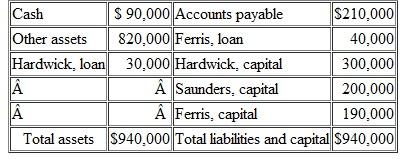 The partners decide to liquidate the partnership.Forty percent of the other assets are sold for I $200,000.Prepare a proposed schedule of liquidation.
The partners decide to liquidate the partnership.Forty percent of the other assets are sold for I $200,000.Prepare a proposed schedule of liquidation.
 The partners decide to liquidate the partnership.Forty percent of the other assets are sold for I $200,000.Prepare a proposed schedule of liquidation.
The partners decide to liquidate the partnership.Forty percent of the other assets are sold for I $200,000.Prepare a proposed schedule of liquidation.
Unlock Deck
Unlock for access to all 39 flashcards in this deck.
Unlock Deck
k this deck
17
After liquidating all property and paying partnership obligations, what is the basis for allocating remaining cash among the partners

Unlock Deck
Unlock for access to all 39 flashcards in this deck.
Unlock Deck
k this deck
18
The following condensed balance sheet is for the partnership of Miller, Tyson, and Watson, who share profits and losses in the ratio of 6:2:2, respectively: 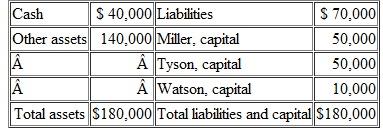 For how much money must the other assets be sold so that each partner receives some amount of cash in a liquidation
For how much money must the other assets be sold so that each partner receives some amount of cash in a liquidation
 For how much money must the other assets be sold so that each partner receives some amount of cash in a liquidation
For how much money must the other assets be sold so that each partner receives some amount of cash in a liquidation
Unlock Deck
Unlock for access to all 39 flashcards in this deck.
Unlock Deck
k this deck
19
A local partnership is considering possible liquidation because one of the partners (Bell) is insolvent.Capital balances at the current time are as follows.Profits and losses are divided on a 4:3:2:1 basis, respectively.  Bell's creditors have filed a $21,000 claim against the partnership's assets.The partnership currently holds assets reported at $300,000 and liabilities of $100,000.If the assets can be sold for $190,000, what is the minimum amount that Bell's creditors would receive
Bell's creditors have filed a $21,000 claim against the partnership's assets.The partnership currently holds assets reported at $300,000 and liabilities of $100,000.If the assets can be sold for $190,000, what is the minimum amount that Bell's creditors would receive
a.-0 -
b.$2,000.
c.$2,800.
d.$6,000.
 Bell's creditors have filed a $21,000 claim against the partnership's assets.The partnership currently holds assets reported at $300,000 and liabilities of $100,000.If the assets can be sold for $190,000, what is the minimum amount that Bell's creditors would receive
Bell's creditors have filed a $21,000 claim against the partnership's assets.The partnership currently holds assets reported at $300,000 and liabilities of $100,000.If the assets can be sold for $190,000, what is the minimum amount that Bell's creditors would receive a.-0 -
b.$2,000.
c.$2,800.
d.$6,000.

Unlock Deck
Unlock for access to all 39 flashcards in this deck.
Unlock Deck
k this deck
20
A partnership's balance sheet is as follows:  Babb, Whitaker, and Edwards share profits and losses in the ratio of 4:2:4, respectively.This business is to be terminated, and the partners estimate that $8,000 in liquidation expenses will be incurred.How should the $2,000 in safe cash that is presently held be disbursed
Babb, Whitaker, and Edwards share profits and losses in the ratio of 4:2:4, respectively.This business is to be terminated, and the partners estimate that $8,000 in liquidation expenses will be incurred.How should the $2,000 in safe cash that is presently held be disbursed
 Babb, Whitaker, and Edwards share profits and losses in the ratio of 4:2:4, respectively.This business is to be terminated, and the partners estimate that $8,000 in liquidation expenses will be incurred.How should the $2,000 in safe cash that is presently held be disbursed
Babb, Whitaker, and Edwards share profits and losses in the ratio of 4:2:4, respectively.This business is to be terminated, and the partners estimate that $8,000 in liquidation expenses will be incurred.How should the $2,000 in safe cash that is presently held be disbursed
Unlock Deck
Unlock for access to all 39 flashcards in this deck.
Unlock Deck
k this deck
21
What is the purpose of a schedule of liquidation What information does it convey to its readers

Unlock Deck
Unlock for access to all 39 flashcards in this deck.
Unlock Deck
k this deck
22
A partnership has liquidated all assets but still reports the following account balances: 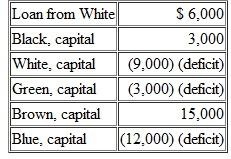 The partners split profits and losses as follows: Black, 30 percent; White, 30 percent; Green, 10 percent; Brown, 20 percent; and Blue, 10 percent,
The partners split profits and losses as follows: Black, 30 percent; White, 30 percent; Green, 10 percent; Brown, 20 percent; and Blue, 10 percent,
Assuming that all partners are personally insolvent except for Green and Brown, how much; cash must Green now contribute to this partnership
 The partners split profits and losses as follows: Black, 30 percent; White, 30 percent; Green, 10 percent; Brown, 20 percent; and Blue, 10 percent,
The partners split profits and losses as follows: Black, 30 percent; White, 30 percent; Green, 10 percent; Brown, 20 percent; and Blue, 10 percent,Assuming that all partners are personally insolvent except for Green and Brown, how much; cash must Green now contribute to this partnership

Unlock Deck
Unlock for access to all 39 flashcards in this deck.
Unlock Deck
k this deck
23
According to the Uniform Partnership Act, what events should occur if a partner incuis a negative capital balance during the liquidation process

Unlock Deck
Unlock for access to all 39 flashcards in this deck.
Unlock Deck
k this deck
24
The following balance sheet is for a local partnership in which the partners have become very unhappy with each other. 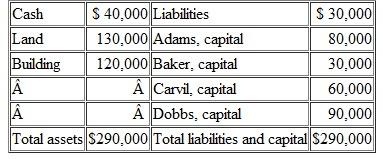 To avoid more conflict, the partners have decided to cease operations and sell all assets.Using this information, answer the following questions.Each question should be viewed as an independent situation related to the partnership's liquidation.
To avoid more conflict, the partners have decided to cease operations and sell all assets.Using this information, answer the following questions.Each question should be viewed as an independent situation related to the partnership's liquidation.
a.The $10,000 cash that exceeds the partnership liabilities is to be disbursed immediately.If profits and losses are allocated to Adams, Baker, Carvil, and Dobbs on a 2:3:3:2 basis, respectively, how will the $10,000 be divided
b.The $10,000 cash that exceeds the partnership liabilities is to be disbursed immediately.If profits and losses are allocated on a 2:2:3:3 basis, respectively, how will the $10,000 be divided
c.The building is immediately sold for $70,000 to give total cash of $110,000.The liabilities are then paid, leaving a cash balance of $80,000.This cash is to be distributed to the partners.How much of this money will each partner receive if profits and losses are allocated to Adams, Baker, Carvil, and Dobbs on a 1:3:3:3 basis, respectively
d.Assume that profits and losses are allocated to Adams, Baker, Carvil, and Dobbs on a 1:3:4:2 basis, respectively.How much money must the firm receive from selling the land and building to ensure that Carvil receives a portion
 To avoid more conflict, the partners have decided to cease operations and sell all assets.Using this information, answer the following questions.Each question should be viewed as an independent situation related to the partnership's liquidation.
To avoid more conflict, the partners have decided to cease operations and sell all assets.Using this information, answer the following questions.Each question should be viewed as an independent situation related to the partnership's liquidation.a.The $10,000 cash that exceeds the partnership liabilities is to be disbursed immediately.If profits and losses are allocated to Adams, Baker, Carvil, and Dobbs on a 2:3:3:2 basis, respectively, how will the $10,000 be divided
b.The $10,000 cash that exceeds the partnership liabilities is to be disbursed immediately.If profits and losses are allocated on a 2:2:3:3 basis, respectively, how will the $10,000 be divided
c.The building is immediately sold for $70,000 to give total cash of $110,000.The liabilities are then paid, leaving a cash balance of $80,000.This cash is to be distributed to the partners.How much of this money will each partner receive if profits and losses are allocated to Adams, Baker, Carvil, and Dobbs on a 1:3:3:3 basis, respectively
d.Assume that profits and losses are allocated to Adams, Baker, Carvil, and Dobbs on a 1:3:4:2 basis, respectively.How much money must the firm receive from selling the land and building to ensure that Carvil receives a portion

Unlock Deck
Unlock for access to all 39 flashcards in this deck.
Unlock Deck
k this deck
25
A partnership has the following balance sheet just before final liquidation is to begin:  Liquidation expenses are estimated to be $12,000.The other assets are sold for $40,000.What distribution can be made to the partners a.-0-to Art, $1,500 to Raymond, $2,500 to Darby.
Liquidation expenses are estimated to be $12,000.The other assets are sold for $40,000.What distribution can be made to the partners a.-0-to Art, $1,500 to Raymond, $2,500 to Darby.
B)$1,333 to Art, $1,333 to Raymond, $1,334 to Darby.
C)-0- to Art, $ 1,200 to Raymond, $2,800 to Darby.
D)$600 to Art, $1,200 to Raymond, $2,200 to Darby.
 Liquidation expenses are estimated to be $12,000.The other assets are sold for $40,000.What distribution can be made to the partners a.-0-to Art, $1,500 to Raymond, $2,500 to Darby.
Liquidation expenses are estimated to be $12,000.The other assets are sold for $40,000.What distribution can be made to the partners a.-0-to Art, $1,500 to Raymond, $2,500 to Darby.B)$1,333 to Art, $1,333 to Raymond, $1,334 to Darby.
C)-0- to Art, $ 1,200 to Raymond, $2,800 to Darby.
D)$600 to Art, $1,200 to Raymond, $2,200 to Darby.

Unlock Deck
Unlock for access to all 39 flashcards in this deck.
Unlock Deck
k this deck
26
The partnership of Larson, Norris, Spencer, and Harrison has decided to terminate operations and liquidate all business property.During this process, the partners expect to incur $8,000 in liquidation expenses.All partners are currently solvent.
The balance sheet reported by this partnership at the time that the liquidation commenced follows.The percentages indicate the allocation of profits and losses to each of the four partners.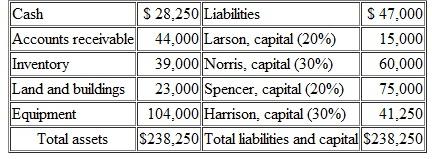 Based on the information provided, prepare a predistribution plan for liquidating this partnership.
Based on the information provided, prepare a predistribution plan for liquidating this partnership.
The balance sheet reported by this partnership at the time that the liquidation commenced follows.The percentages indicate the allocation of profits and losses to each of the four partners.
 Based on the information provided, prepare a predistribution plan for liquidating this partnership.
Based on the information provided, prepare a predistribution plan for liquidating this partnership.
Unlock Deck
Unlock for access to all 39 flashcards in this deck.
Unlock Deck
k this deck
27
How are safe capital balances computed when preliminary distributions of cash are to be made during a partnership liquidation

Unlock Deck
Unlock for access to all 39 flashcards in this deck.
Unlock Deck
k this deck
28
The following partnership is being liquidated: 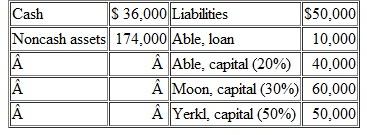 a.Liquidation expenses are estimated to be $12,000.Prepare a predistribution schedule to guide the distribution of cash.
a.Liquidation expenses are estimated to be $12,000.Prepare a predistribution schedule to guide the distribution of cash.
b.Assume that assets costing $28,000 are sold for $40,000.How is the available cash to be divided
 a.Liquidation expenses are estimated to be $12,000.Prepare a predistribution schedule to guide the distribution of cash.
a.Liquidation expenses are estimated to be $12,000.Prepare a predistribution schedule to guide the distribution of cash.b.Assume that assets costing $28,000 are sold for $40,000.How is the available cash to be divided

Unlock Deck
Unlock for access to all 39 flashcards in this deck.
Unlock Deck
k this deck
29
A partnership has the following capital balances: A (20% of profits and losses) = $100,000; B (30% of profits and losses) = $120,000; C (50% of profits and losses) = $180,000.If the partnership is to be liquidated and $30,000 becomes immediately available, who gets that
money
a.$6,000 to A, $9,000 to B, $15,000 to C.
b.$22,000 to A, $3,000 to B, $5,000 to C.
c.$22,000 to A, $8,000 to B,-0-to C.
d.$24,000 to A, $6,000 to B,-0-to C.
money
a.$6,000 to A, $9,000 to B, $15,000 to C.
b.$22,000 to A, $3,000 to B, $5,000 to C.
c.$22,000 to A, $8,000 to B,-0-to C.
d.$24,000 to A, $6,000 to B,-0-to C.

Unlock Deck
Unlock for access to all 39 flashcards in this deck.
Unlock Deck
k this deck
30
A local partnership is to be liquidated.Commissions and other liquidation expenses are expected to total $19,000.The business's balance sheet prior to the commencement of liquidation is as follows:  Prepare a predistribution plan for this partnership.
Prepare a predistribution plan for this partnership.
 Prepare a predistribution plan for this partnership.
Prepare a predistribution plan for this partnership.
Unlock Deck
Unlock for access to all 39 flashcards in this deck.
Unlock Deck
k this deck
31
Go to the Web site www.napico.com and click on "Partnership Financial Information-Click Here." Then click on "2008 Annual Reports" to access the annual report for National Tax Credit Investors II (NTCI II).
Read the financial statements contained in the 2008 annual report and the accompanying notes, especially any that discuss the partnership form of organization.
Assume that an investor is considering investing in this partnership and has downloaded this report for study and analysis.
Required
1.What differences between NTCI II's financial statements and those of an incorporated entity exist
2.Assume that this potential investor is not aware of the potential implications of owning a partnership rather than a corporation.What information is available in these statements to advise this individual of the unique characteristics of this legal business form
Read the financial statements contained in the 2008 annual report and the accompanying notes, especially any that discuss the partnership form of organization.
Assume that an investor is considering investing in this partnership and has downloaded this report for study and analysis.
Required
1.What differences between NTCI II's financial statements and those of an incorporated entity exist
2.Assume that this potential investor is not aware of the potential implications of owning a partnership rather than a corporation.What information is available in these statements to advise this individual of the unique characteristics of this legal business form

Unlock Deck
Unlock for access to all 39 flashcards in this deck.
Unlock Deck
k this deck
32
A partnership is currently holding $400,000 in assets and $234,000 in liabilities.The partnership is to be liquidated, and $20,000 is the best estimation of the expenses that will be incurred during this process.The four partners share profits and losses as shown.Capital balances at the start of the liquidation follow: 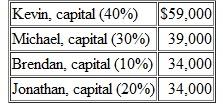 The partners realize that Brendan will be the first partner to start receiving cash.How much cash will Brendan receive before any of the other partners collect any cash a.$12,250.
The partners realize that Brendan will be the first partner to start receiving cash.How much cash will Brendan receive before any of the other partners collect any cash a.$12,250.
B)$14,750.
C)$17,000.
D)$19,500.
 The partners realize that Brendan will be the first partner to start receiving cash.How much cash will Brendan receive before any of the other partners collect any cash a.$12,250.
The partners realize that Brendan will be the first partner to start receiving cash.How much cash will Brendan receive before any of the other partners collect any cash a.$12,250.B)$14,750.
C)$17,000.
D)$19,500.

Unlock Deck
Unlock for access to all 39 flashcards in this deck.
Unlock Deck
k this deck
33
The following information concerns two different partnerships.These problems should be viewed as independent situations.
Part A
The partnership of Ross, Milburn, and Thomas has the following account balances: This partnership is being liquidated.Ross and Milburn are each entitled to 40 percent of all profits and losses with the remaining 20 percent to Thomas.
This partnership is being liquidated.Ross and Milburn are each entitled to 40 percent of all profits and losses with the remaining 20 percent to Thomas.
a.What is the maximum amount that Milburn might have to contribute to this partnership because of the deficit capital balance
b.How should the $ 19,000 cash that is presently available in excess of liabilities be distributed
c.If the noncash assets are sold for a total of $41,000, what is the minimum amount of cash that Thomas could receive
Part B
The partnership of Sampson, Klingon, Carton, and Romulan is being liquidated.It currently holds cash of $9,000 but no other assets.Liabilities amount to $24,000.The capital balances areas follows: Profits and losses are allocated on the following basis: Sampson, 40 percent, Klingon, 20 percent, Carton, 30 percent, and Romulan, 10 percent.
Profits and losses are allocated on the following basis: Sampson, 40 percent, Klingon, 20 percent, Carton, 30 percent, and Romulan, 10 percent.
a.If both Klingon and Romulan are personally insolvent, how much money must Carton contribute to this partnership
b.If only Romulan is personally insolvent, how much money must Klingon contribute How will these funds be disbursed
c.If only Klingon is personally insolvent, how much money should Sampson receive from the liquidation
Part A
The partnership of Ross, Milburn, and Thomas has the following account balances:
 This partnership is being liquidated.Ross and Milburn are each entitled to 40 percent of all profits and losses with the remaining 20 percent to Thomas.
This partnership is being liquidated.Ross and Milburn are each entitled to 40 percent of all profits and losses with the remaining 20 percent to Thomas.a.What is the maximum amount that Milburn might have to contribute to this partnership because of the deficit capital balance
b.How should the $ 19,000 cash that is presently available in excess of liabilities be distributed
c.If the noncash assets are sold for a total of $41,000, what is the minimum amount of cash that Thomas could receive
Part B
The partnership of Sampson, Klingon, Carton, and Romulan is being liquidated.It currently holds cash of $9,000 but no other assets.Liabilities amount to $24,000.The capital balances areas follows:
 Profits and losses are allocated on the following basis: Sampson, 40 percent, Klingon, 20 percent, Carton, 30 percent, and Romulan, 10 percent.
Profits and losses are allocated on the following basis: Sampson, 40 percent, Klingon, 20 percent, Carton, 30 percent, and Romulan, 10 percent.a.If both Klingon and Romulan are personally insolvent, how much money must Carton contribute to this partnership
b.If only Romulan is personally insolvent, how much money must Klingon contribute How will these funds be disbursed
c.If only Klingon is personally insolvent, how much money should Sampson receive from the liquidation

Unlock Deck
Unlock for access to all 39 flashcards in this deck.
Unlock Deck
k this deck
34
Read the following as well as any other published articles on the bankruptcy of the partnership of Laventhol Horwath:
"Laventhol Says It Plans to File for Chapter 11," The Wall Street Journal, November 20, 1990, p.A3.
"Laventhol Partners Face Long Process That Could End in Personal Bankruptcy," The Wall Street Journal, November 20, 1990, p.B5.
"Laventhol Bankruptcy Filing Indicates Liabilities May Be as Much as $2 Billion," The Wall Street Journal, November 23, 1990, p.A4.
Required
Write a report describing the potential liabilities that the members of a partnership could incur.
"Laventhol Says It Plans to File for Chapter 11," The Wall Street Journal, November 20, 1990, p.A3.
"Laventhol Partners Face Long Process That Could End in Personal Bankruptcy," The Wall Street Journal, November 20, 1990, p.B5.
"Laventhol Bankruptcy Filing Indicates Liabilities May Be as Much as $2 Billion," The Wall Street Journal, November 23, 1990, p.A4.
Required
Write a report describing the potential liabilities that the members of a partnership could incur.

Unlock Deck
Unlock for access to all 39 flashcards in this deck.
Unlock Deck
k this deck
35
What is the purpose of a proposed schedule of liquidation, and how is it developed

Unlock Deck
Unlock for access to all 39 flashcards in this deck.
Unlock Deck
k this deck
36
March, April, and May have been in partnership for a number of years.The partners allocate all profits and losses on a 2:3:1 basis, respectively.Recently, each partner has become personally insolvent and, thus, the partners have decided to liquidate the business in hopes of remedying their personal financial problems.As of September 1, the partnership's balance sheet is as follows:  Prepare journal entries for the following transactions:
Prepare journal entries for the following transactions:
a.Sold all inventory for $56,000 cash.
b.Paid $7,500 in liquidation expenses.
c.Paid $40,000 of the partnership's liabilities.
d.Collected $45,000 of the accounts receivable.
e.Distributed safe cash balances; the partners anticipate no further liquidation expenses.
f.Sold remaining accounts receivable for 30 percent of face value.
g.Sold land, building, and equipment for $17,000.
h.Paid all remaining liabilities of the partnership.
i.Distributed cash held by the business to the partners.
 Prepare journal entries for the following transactions:
Prepare journal entries for the following transactions:a.Sold all inventory for $56,000 cash.
b.Paid $7,500 in liquidation expenses.
c.Paid $40,000 of the partnership's liabilities.
d.Collected $45,000 of the accounts receivable.
e.Distributed safe cash balances; the partners anticipate no further liquidation expenses.
f.Sold remaining accounts receivable for 30 percent of face value.
g.Sold land, building, and equipment for $17,000.
h.Paid all remaining liabilities of the partnership.
i.Distributed cash held by the business to the partners.

Unlock Deck
Unlock for access to all 39 flashcards in this deck.
Unlock Deck
k this deck
37
If a partnership is liquidated, how is the final allocation of business assets made to the partners
a.Equally.
b.According to the profit and loss ratio.
c.According to the final capital account balances.
d.According to the initial investment made by each of the partners.
a.Equally.
b.According to the profit and loss ratio.
c.According to the final capital account balances.
d.According to the initial investment made by each of the partners.

Unlock Deck
Unlock for access to all 39 flashcards in this deck.
Unlock Deck
k this deck
38
Carney, Pierce, Menton, and Hoehn are partners who share profits and losses on a 4:3:2:1 basis, respectively.They are beginning to liquidate the business.At the start of this process, capital balances are as follows: 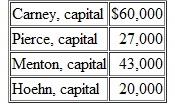 Which of the following statements is true a.The first available $2,000 will go to Hoehn.
Which of the following statements is true a.The first available $2,000 will go to Hoehn.
B)Carney will be the last partner to receive any available cash.
C)The first available $3,000 will go to Menton.
D)Carney will collect a portion of any available cash before Hoehn receives money.
 Which of the following statements is true a.The first available $2,000 will go to Hoehn.
Which of the following statements is true a.The first available $2,000 will go to Hoehn.B)Carney will be the last partner to receive any available cash.
C)The first available $3,000 will go to Menton.
D)Carney will collect a portion of any available cash before Hoehn receives money.

Unlock Deck
Unlock for access to all 39 flashcards in this deck.
Unlock Deck
k this deck
39
The partnership of W, X, Y, and Z has the following balance sheet:  Z is personally insolvent, and one of his creditors is considering suing the partnership for the $5,000 that is currently due.The creditor realizes that liquidation could result from this litigation and does not wish to force such an extreme action unless the creditor is reasonably sure of getting the money that is due.If the partnership sells the other assets, how much money must it receive to ensure that $5,000 would be available from Z's portion of the business Liquidation expenses are expected to be $15,000.
Z is personally insolvent, and one of his creditors is considering suing the partnership for the $5,000 that is currently due.The creditor realizes that liquidation could result from this litigation and does not wish to force such an extreme action unless the creditor is reasonably sure of getting the money that is due.If the partnership sells the other assets, how much money must it receive to ensure that $5,000 would be available from Z's portion of the business Liquidation expenses are expected to be $15,000.
 Z is personally insolvent, and one of his creditors is considering suing the partnership for the $5,000 that is currently due.The creditor realizes that liquidation could result from this litigation and does not wish to force such an extreme action unless the creditor is reasonably sure of getting the money that is due.If the partnership sells the other assets, how much money must it receive to ensure that $5,000 would be available from Z's portion of the business Liquidation expenses are expected to be $15,000.
Z is personally insolvent, and one of his creditors is considering suing the partnership for the $5,000 that is currently due.The creditor realizes that liquidation could result from this litigation and does not wish to force such an extreme action unless the creditor is reasonably sure of getting the money that is due.If the partnership sells the other assets, how much money must it receive to ensure that $5,000 would be available from Z's portion of the business Liquidation expenses are expected to be $15,000.
Unlock Deck
Unlock for access to all 39 flashcards in this deck.
Unlock Deck
k this deck


